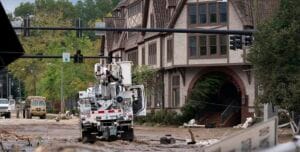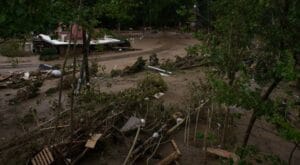The Biltmore Estate, a national treasure and the largest privately owned home in the United States, has faced significant challenges after Hurricane Helene battered parts of North Carolina. This iconic estate, known for its stunning architecture and lush gardens, has been a symbol of heritage and culture for many. But how much damage did Helene cause, and what does it mean for this beloved landmark? Let’s dive into the details!
Impact of Hurricane Helene on North Carolina
Weather Conditions During the Storm
Hurricane Helene brought torrential rains, fierce winds, and widespread flooding to North Carolina, leaving a trail of destruction in its wake. The storm’s intensity caught many off guard, with reports of gusts exceeding 70 mph in some regions.
Areas Most Affected
While various communities faced devastation, the Western North Carolina area was particularly hard-hit. Asheville, home to the Biltmore Estate, saw significant rainfall, causing landslides and road closures.
Extent of Damage at Biltmore Estate
Damage to Gardens and Grounds
The Biltmore Gardens, renowned for their beauty, didn’t escape unscathed.
Specific Areas Affected
Many flowers and shrubs were uprooted, and the meticulous landscaping was severely disrupted. The iconic rose garden, a favorite spot for visitors, has reportedly suffered extensive damage.
Damage to the Mansion
The mansion itself, a masterpiece of architecture, also endured its share of damage.
While the main structure remained intact, some windows were broken, and water intrusion was noted in various areas. The vast expanse of the estate means that while the core structure survived, the maintenance needed to restore its full glory is substantial.
Historical Artifacts and Structures
One of the most concerning aspects of the storm is the potential damage to historical artifacts housed within the mansion. While assessments are ongoing, there are worries about water damage to valuable pieces that tell the story of the estate’s rich history.
Response and Recovery Efforts
Initial Assessment by Staff
Immediately after the storm passed, staff members at the Biltmore Estate began a thorough assessment of the damage. The team prioritized ensuring the safety of the estate and its visitors while documenting the areas needing urgent attention.
Cleanup Plans and Restoration Efforts
Plans are already in motion to begin cleanup efforts. Landscape teams are working hard to restore the gardens, while conservationists are focused on protecting and restoring historical artifacts.
The estate’s management has emphasized their commitment to restoring the grounds and mansion, understanding the deep connection many have with this historic site.
Community Reactions
Local Residents’ Sentiments
The local community has expressed deep concern for the Biltmore Estate. Many residents view it not just as a tourist attraction but as an integral part of their identity and heritage.
Support for Biltmore Estate
Support for the estate has poured in from both locals and visitors. Many are rallying to offer assistance, whether through volunteering or contributing financially to restoration efforts.
The Significance of the Biltmore Estate
Historical Importance
The Biltmore Estate is not just a beautiful building; it’s a piece of American history. Built by George Washington Vanderbilt II in the late 19th century, the estate showcases the opulence of the Gilded Age and has been a significant influence on architectural design in the region.
Economic Impact on Tourism
The estate also plays a vital role in the local economy. As one of the most visited attractions in the state, its recovery is crucial for the tourism industry in Western North Carolina, which heavily relies on visitors to the estate.
Looking Ahead
Future Resilience Plans
In light of the damage, the Biltmore Estate is also considering long-term resilience plans. These might include enhanced stormwater management systems and structural reinforcements to protect against future storms.
How to Support the Biltmore Estate
Visitors and supporters can play a pivotal role in the estate’s recovery. Purchasing tickets, visiting the estate once it reopens, or donating to restoration efforts can all contribute to revitalizing this iconic location.
Conclusion
The damage inflicted by Hurricane Helene on the Biltmore Estate is significant, but the spirit of resilience remains strong. As assessments continue and recovery efforts ramp up, the community’s support and commitment will be crucial in restoring this beloved landmark to its former glory. With its rich history and cultural significance, the Biltmore Estate will undoubtedly bounce back stronger than ever.
2025 COLA Announcement Coming Soon | 2025 COLA increase social security
FAQs
What is the Biltmore Estate?
The Biltmore Estate is the largest privately owned home in the U.S., built by George Washington Vanderbilt II in the late 1800s.
How has Hurricane Helene affected other parts of North Carolina?
Many areas experienced severe flooding, road closures, and power outages, with damage reports coming in from various communities.
What steps are being taken to restore the Biltmore Estate?
The estate is actively assessing damage and planning cleanup and restoration efforts, focusing on gardens and historical artifacts.
How can visitors support the estate during recovery?
Purchasing tickets and visiting once it reopens, as well as donating to restoration efforts, are great ways to show support.
Will the estate be open to the public soon?
While restoration efforts are underway, updates on reopening will be communicated through the estate’s official channels.




